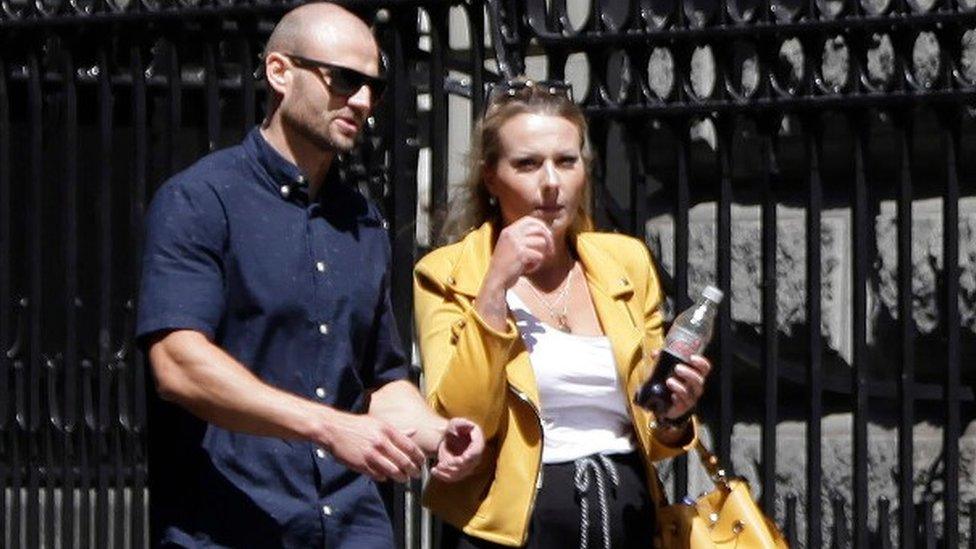Down's syndrome: 'In all honesty we were offered 15 terminations'
- Published
Ninety per cent of women whose unborn babies are diagnosed with Down's syndrome choose to have an abortion, which is legal right up until birth. But campaigners say expectant parents are routinely given outdated advice and encouraged to have a termination. We hear from three mothers who want the system to change.

'The support was only there if I chose an abortion'
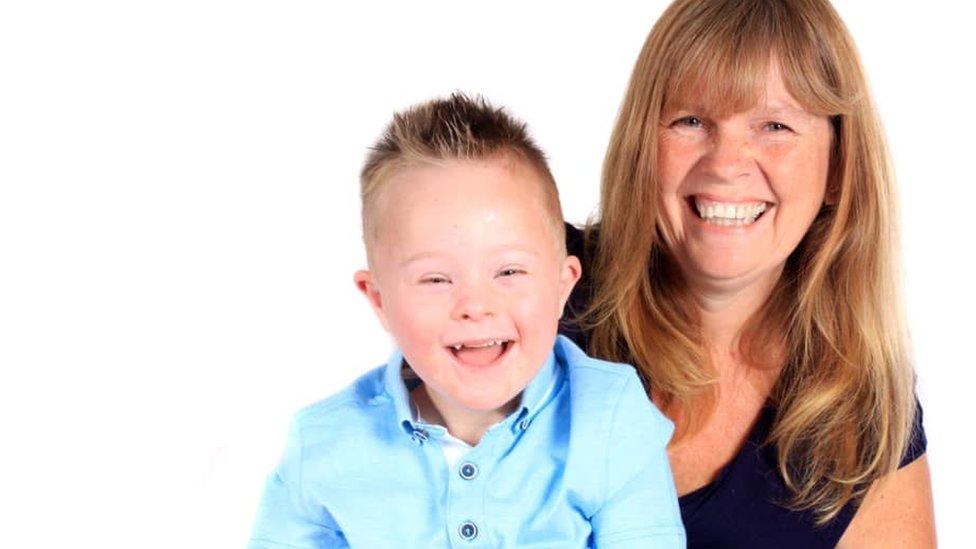
Lorraine Buckmaster says she felt under pressure to abort her son Jaxon
Jaxon Buckmaster is, in many ways, a typical six-year-old boy. He loves swimming, cars, dinosaurs, Mickey Mouse and performing on stage with his musical theatre group.
The youngest of five children, he is described as "a little comedian" with a "really cheeky" sense of humour.
Jaxon also has Down's syndrome, meaning he has an extra chromosome and a learning disability.
"It takes him longer to reach milestones, but we celebrate them so much more because they are such an achievement for him," his mother Lorraine says.
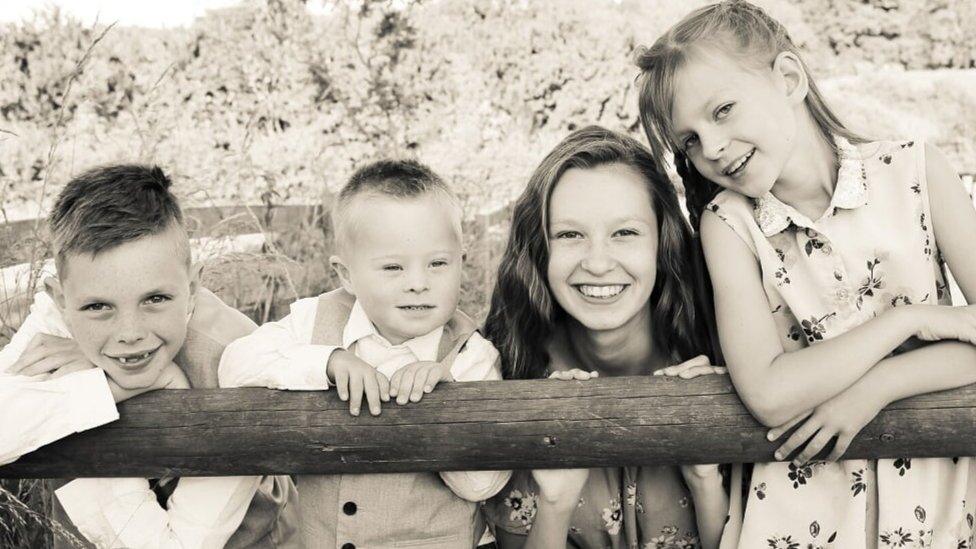
Jaxon with his older brother Cavan (left), and older sisters Genna (right) and Lexi (far right)
Jaxon excels at his mainstream school, where he has lots of friends, and has no other health conditions.
So Lorraine, who lives in Milton Keynes, cannot understand why midwives were so negative about the condition when she was pregnant.
She found out Jaxon might have Down's syndrome after being persuaded to have an extra screening and a blood test due to her age.
"I was 45 at the time and knew there would be a higher chance, but it didn't matter to me," she says. "The midwife said we would get longer to see Jaxon on the screen so we went along with it."
The sonographer explained that if the baby showed markers of the condition, the next step would be an amniocentesis, a test which carries a small chance of a miscarriage.
"I said no, we wouldn't be interested, partly because we had lost a baby the previous year. She was very aggressive and said 'women like you make me sick. Why bother having a screening at all if you're not going to do anything about it?'"
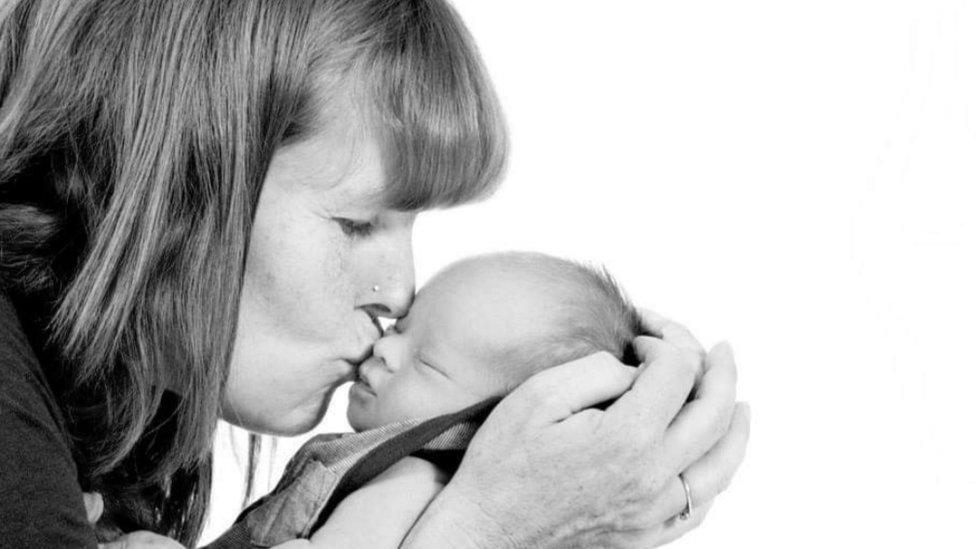
Jaxon has no other health complications and his mother says he excels at his mainstream school
A midwife later phoned, saying she was "ever so sorry" but had "really bad news", confirming the baby had a one-in-five chance of having Down's syndrome.
Lorraine and her husband Mark declined all further testing. They wanted to keep their baby, no matter what.
"The support was only there if I chose to have an abortion, and that was what they presumed, but they weren't interested when I said I wanted to keep Jaxon," Lorraine adds.
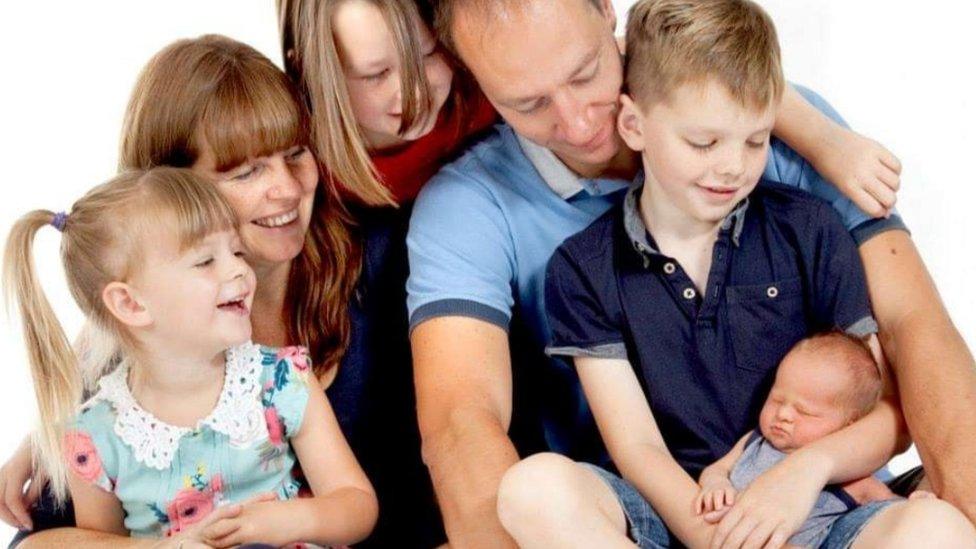
Jaxon is the youngest of five children and is adored by his family and friends
Jaxon was diagnosed at birth and Lorraine says the family has never looked back. She says her other children adore him and will fight over who gets to look after him when they are older.
"I want him to get married and work and have a normal future," she says. "We know he will always need support but we really believe he will lead a full life. He's a showman, a real entertainer and we think he will end up on the stage."

'At 38 weeks, I was told I could still terminate'
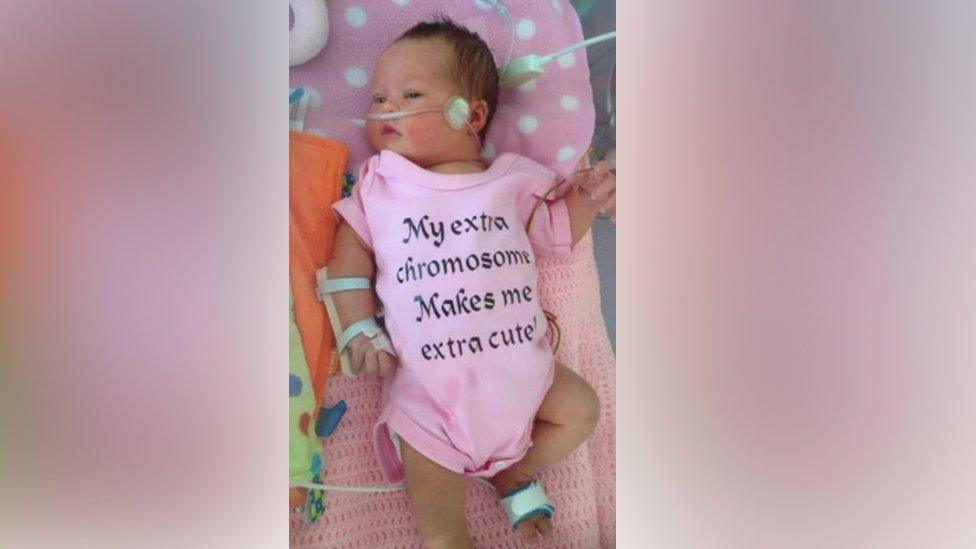
Jaimie was diagnosed with Down's syndrome at birth but has no other health complications
Emma Mellor felt under pressure to abort her daughter Jaimie throughout her pregnancy. Aged 24 at the time, she already had a young son with her husband Steve.
"In all honesty we were offered 15 terminations, even though we made it really clear that it wasn't an option for us, but they really seemed to push and really seemed to want us to terminate," she says.
At her 20-week scan, Emma was told her daughter had some fluid on her brain. Doctors said she was likely to be disabled.
"From that moment on, they recommended we should terminate and told us to think about the effect on our son and his quality of life."
Their son Logan was on the waiting list for surgery at the time, having been born with a hole in his heart.
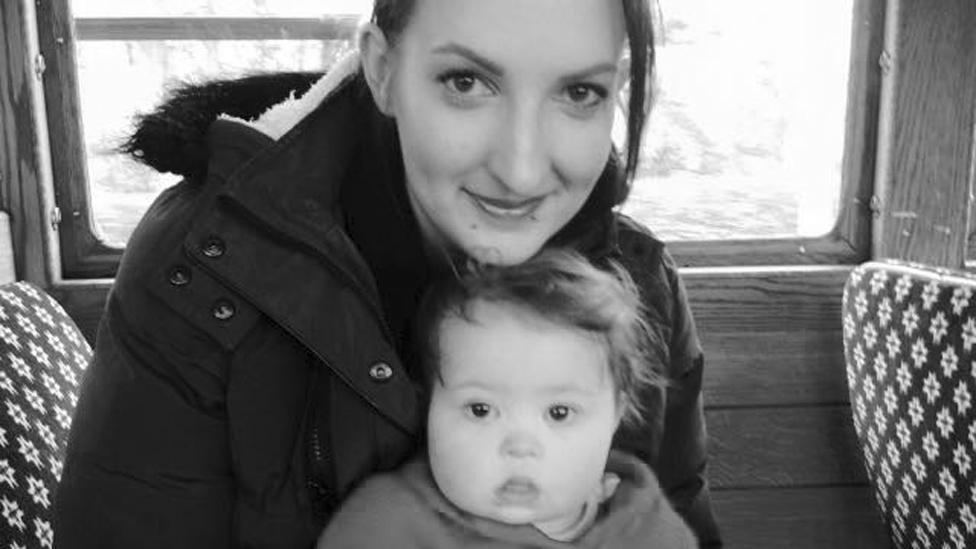
Emma says she felt under pressure to abort her daughter Jaimie throughout her pregnancy
Emma says they could not imagine ending their daughter's life with an injection in the heart to stop it beating - the recommended termination method after 22 weeks - while they were waiting to fix their son's.
"It inspired us to make the right choice. We decided to carry on and hope for the best."
At 32 weeks, a test showed she had Down's syndrome and doctors reminded Emma several times that she could be legally aborted until birth.
"At 38 weeks, the doctors made it really, really, really clear that if I changed my mind on the morning of the induction to let them know, because it wasn't too late.
"I was told that until my baby had started travelling down the birth canal, I could still terminate."
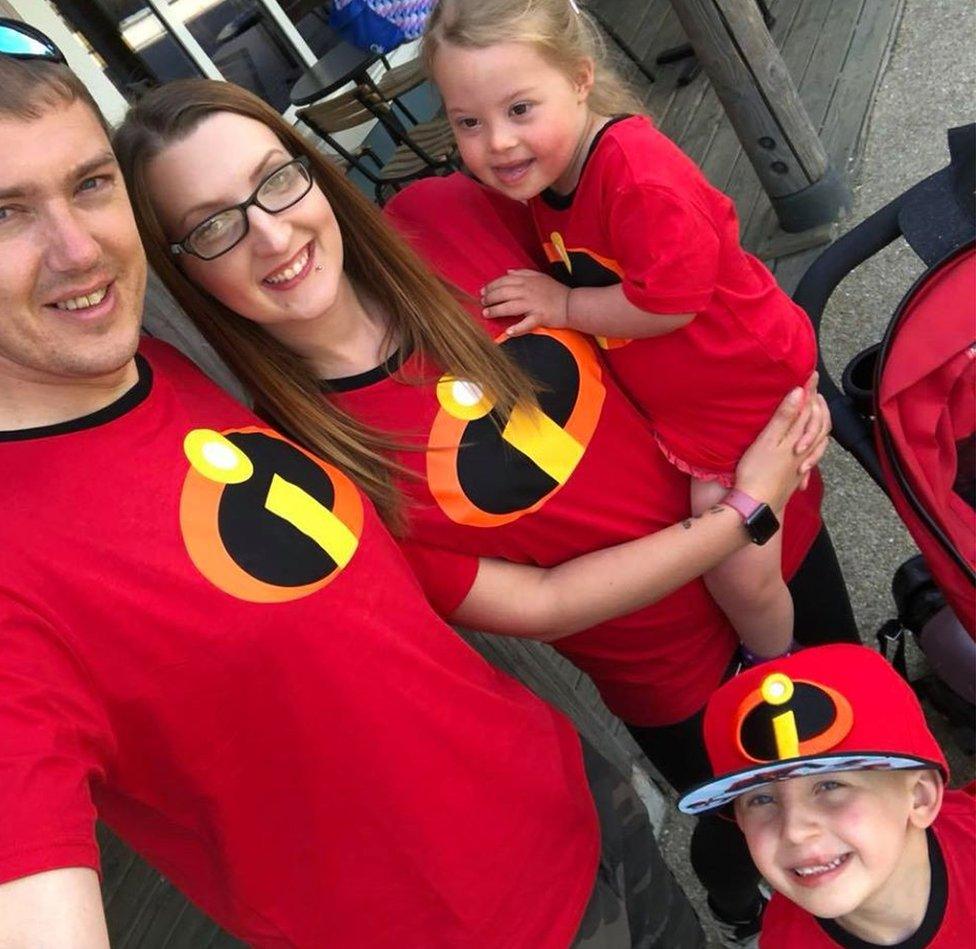
Jaimie is best friends with her brother Logan and has a very loving relationship with her parents
When Jaimie was born, Emma was told she had Down's syndrome but was otherwise healthy.
Five years on, Jaimie is "the best of friends" with her brother and attends a mainstream school in Lincolnshire, where she is ahead of some of her peers for reading.
"She loves dancing and trampolining. She has a few difficulties but she is just like any other child her age. She lights up the room and people just gravitate towards her.
"When we got the diagnosis, I did worry about her future. She will undoubtedly face some challenges as she gets older but she is continuously proving that she shouldn't be underestimated.
"Jaimie can do anything that she sets her mind to."
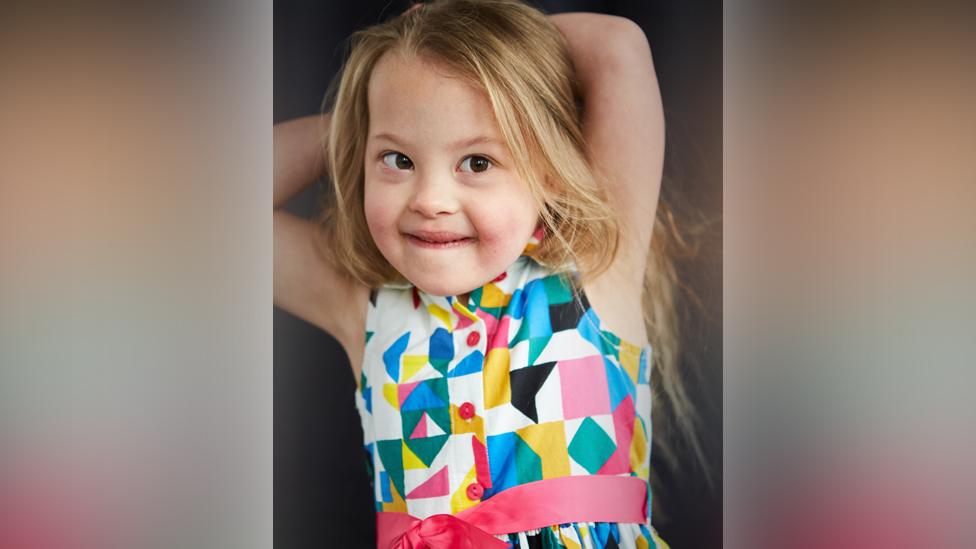
Five-year-old Jaimie loves dancing and trampolining and also enjoys modelling

'I started to ask myself what is so wrong with him having Down's syndrome?'
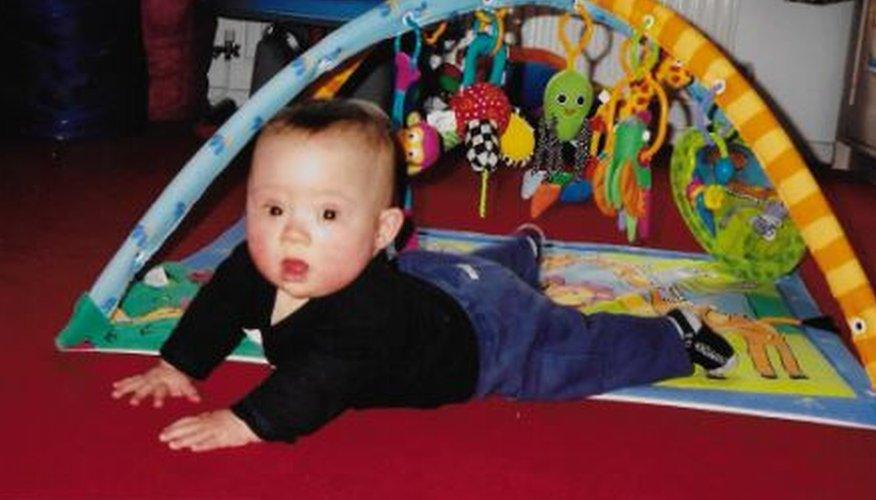
Nicola says she was scared of the future when Tom was born and wanted to hide away from society
Sixteen years ago, Nicola Enoch was certain she did not want a baby with Down's syndrome. Pregnant at 39, she found out there was a higher chance of this happening after a screening and booked in for an amniocentesis.
However, she cancelled at the last minute. Having already suffered four miscarriages, she was concerned it might cause her to lose the baby.

Down's syndrome
For between 700 and 1,000 babies born, one will have Down's syndrome, meaning they have an extra chromosome and a learning disability
About 40,000 people in the UK have the condition
Around half have heart defects but only 10-15% require medical intervention
80% of children with the condition are born to women younger than 35
In the 1960s, life expectancy was 15 - it is now between 50 and 60
Source: NHS/Positive About Down Syndrome

When Tom was born, Nicola was euphoric. But the following day, a paediatrician asked her if she thought he looked normal.
Tom was diagnosed with Down's syndrome and Nicola's world fell apart.
"I was offered absolutely no support to rebuild it," she says. "I felt complete and utter despair and devastation. Gone was this gorgeous baby and instead he was replaced with this unknown entity."
He would never be able to go on a trampoline, doctors said, while a community midwife burst into tears.
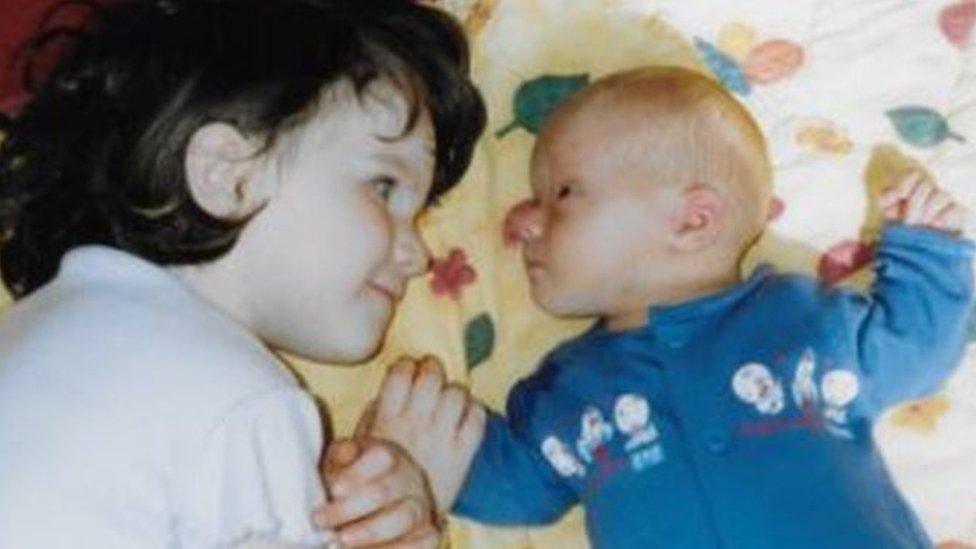
Tom and his older sister Emily are three years apart in age and have a very close relationship
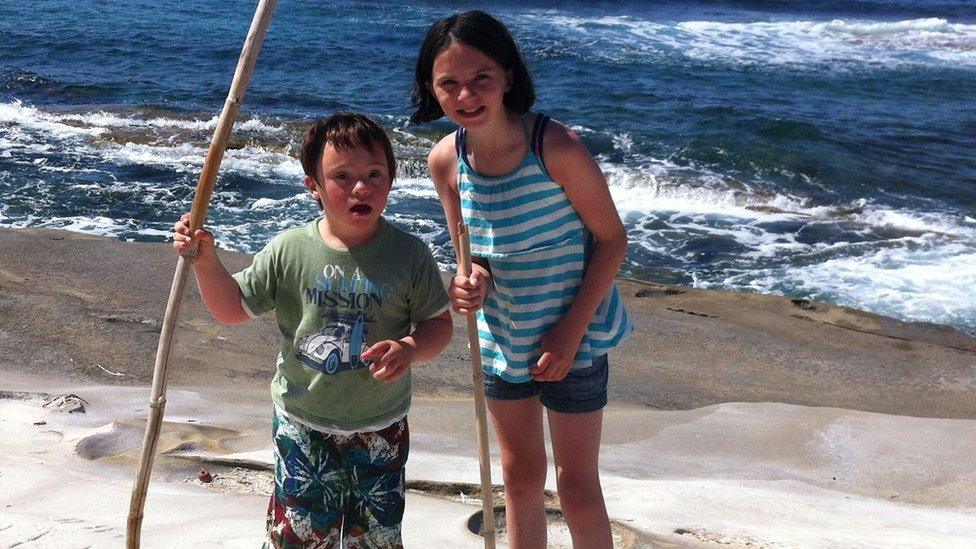
Nicola and John worried Tom would be a burden on his sister but she adores him and he has enriched their lives
Nicola grew increasingly distant from her baby and considered having him adopted.
"I was grieving for the baby I had hoped for and expected, terrified of the future, and I actually wondered if it would be better for us all if Tom didn't survive," she says.
Nicola's maternal bond had been "severed" and it took her more than a year to fall back in love with her son.
"I started to ask myself, 'what is so wrong with him having Down's syndrome?'"
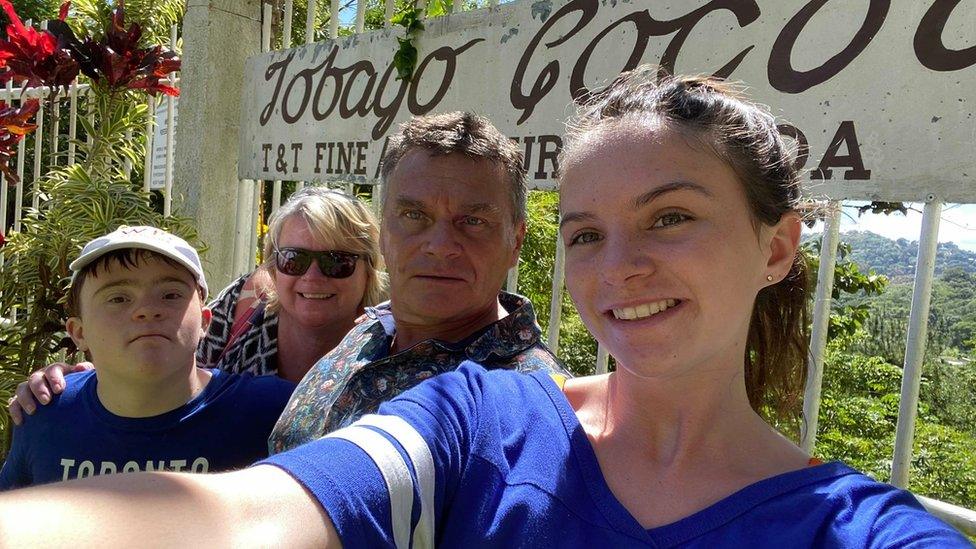
Tom has travelled the world with his his mother Nicola, father John and sister Emily
Tom, now 16, is a pupil in mainstream education. Nicola describes him as "charming, witty and charismatic". A West Bromwich Albion fan, he also enjoys golf, snorkelling and kayaking and hopes to get a job and get married.
Nicola says cancelling the amniocentesis was the best decision she ever made.
"I am terrified I would have terminated Tom's life. I was led to believe he would have a negative impact on our lives but he has enriched them and we are without doubt better people for having him in them."
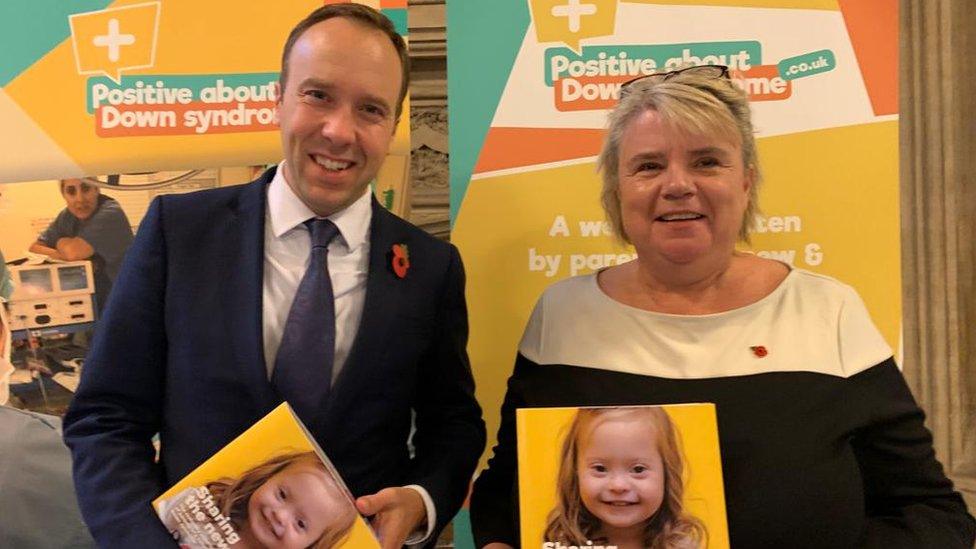
Nicola, pictured with Health Secretary Matt Hancock, spends a lot of time lobbying MPs in the House of Parliament
Nicola runs a charity called The Ups and Downs, which supports more than 70 families, and has set up a website called Positive About Down Syndrome, external.
She has also published several books, external, distributed literature to maternity units across England, provided training sessions for the NHS and successfully campaigned for the advice on its website, external to be changed.
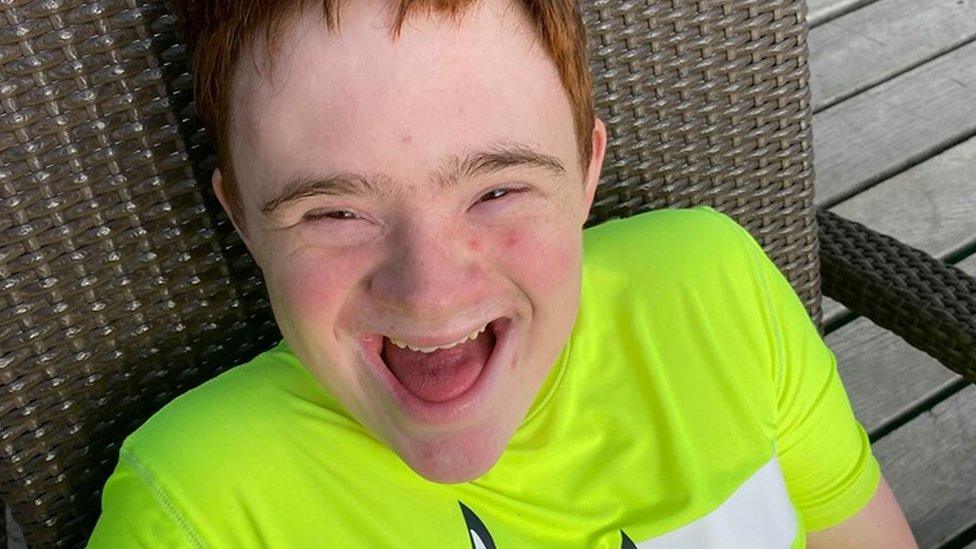
Tom is a West Bromwich Albion fan and enjoys golf, snorkelling and kayaking
Nicola says she worries "every single day" that parents are making life or death decisions based on outdated information.
She also believes the existence of Down's syndrome is under threat by a new blood test called non-invasive prenatal testing, external, which Public Health England (PHE) expects to roll out across England next year.
It will be offered to women whose initial screenings show a higher chance of Down's syndrome. PHE said it wanted to enable parents to make "personal informed choices" and the optional screening "should be offered sensitively, in a non-directive way".
Clare Murphy, deputy chief executive of the British Pregnancy Advisory Service, said the test had simply given women a more accurate and less invasive screening option.
"It is a hugely important step forward in women's healthcare," she said. "To restrict it would be to restrict women's access to the most effective and low-risk way of obtaining information about their own pregnancies - and that would not be ethical at all."

What is the advice given to parents?
The NHS website says it can be a very difficult decision whether to continue a pregnancy with Down's syndrome.
It advises women to speak to medics, external, family, friends and various charities and to people who have been in the same position.
It says women should take their time and that whatever they decide, they will have support.

Find BBC News: East of England on Facebook, external, Instagram, external and Twitter, external. If you have a story suggestion email eastofenglandnews@bbc.co.uk, external
- Published15 October 2020
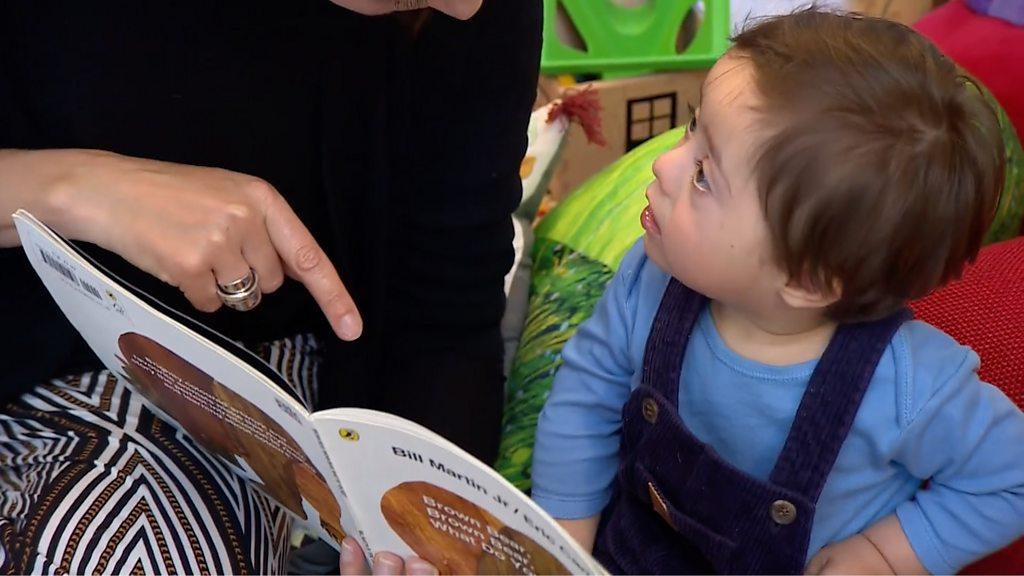
- Published13 January 2020
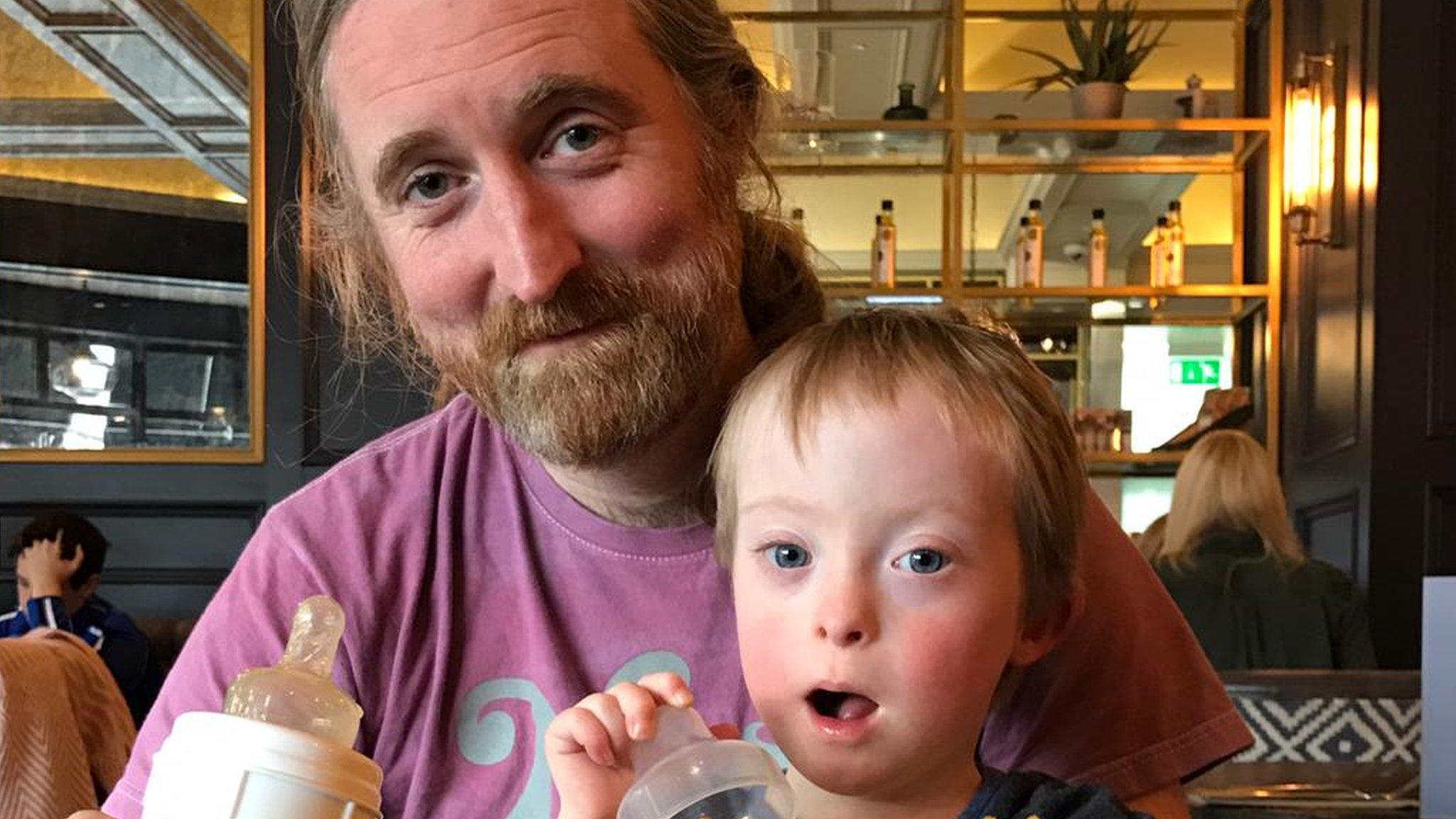
- Published24 February 2020
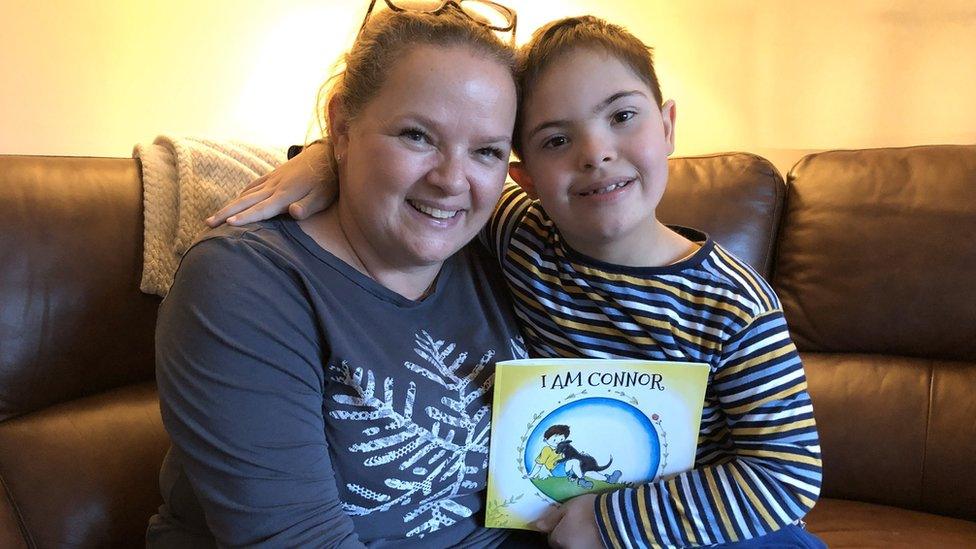
- Published24 February 2020
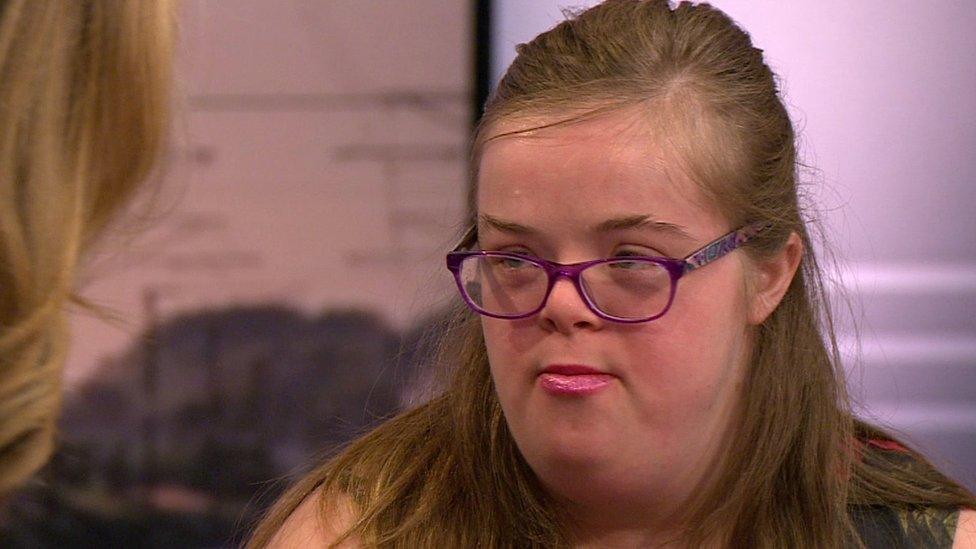
- Published8 October 2019
